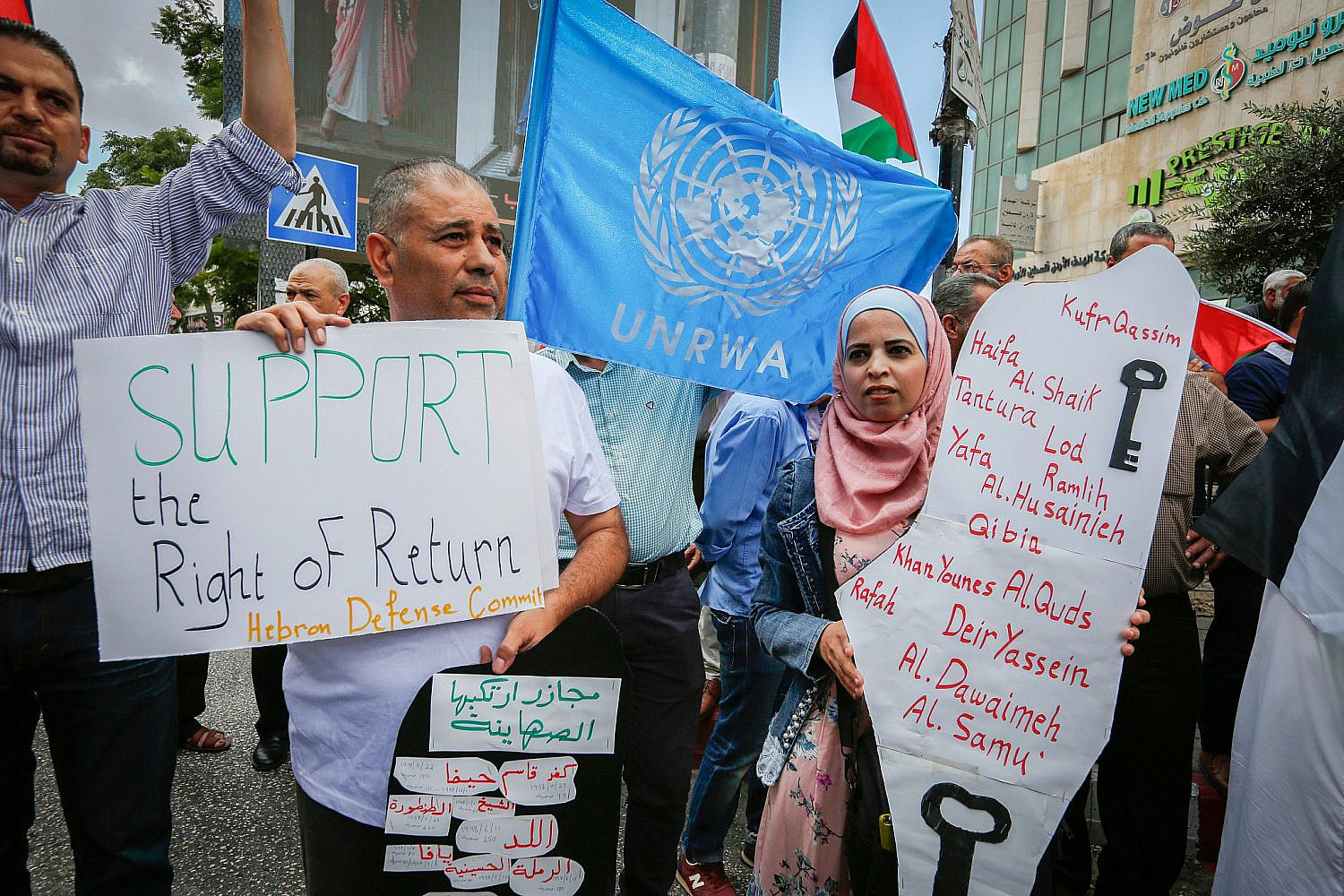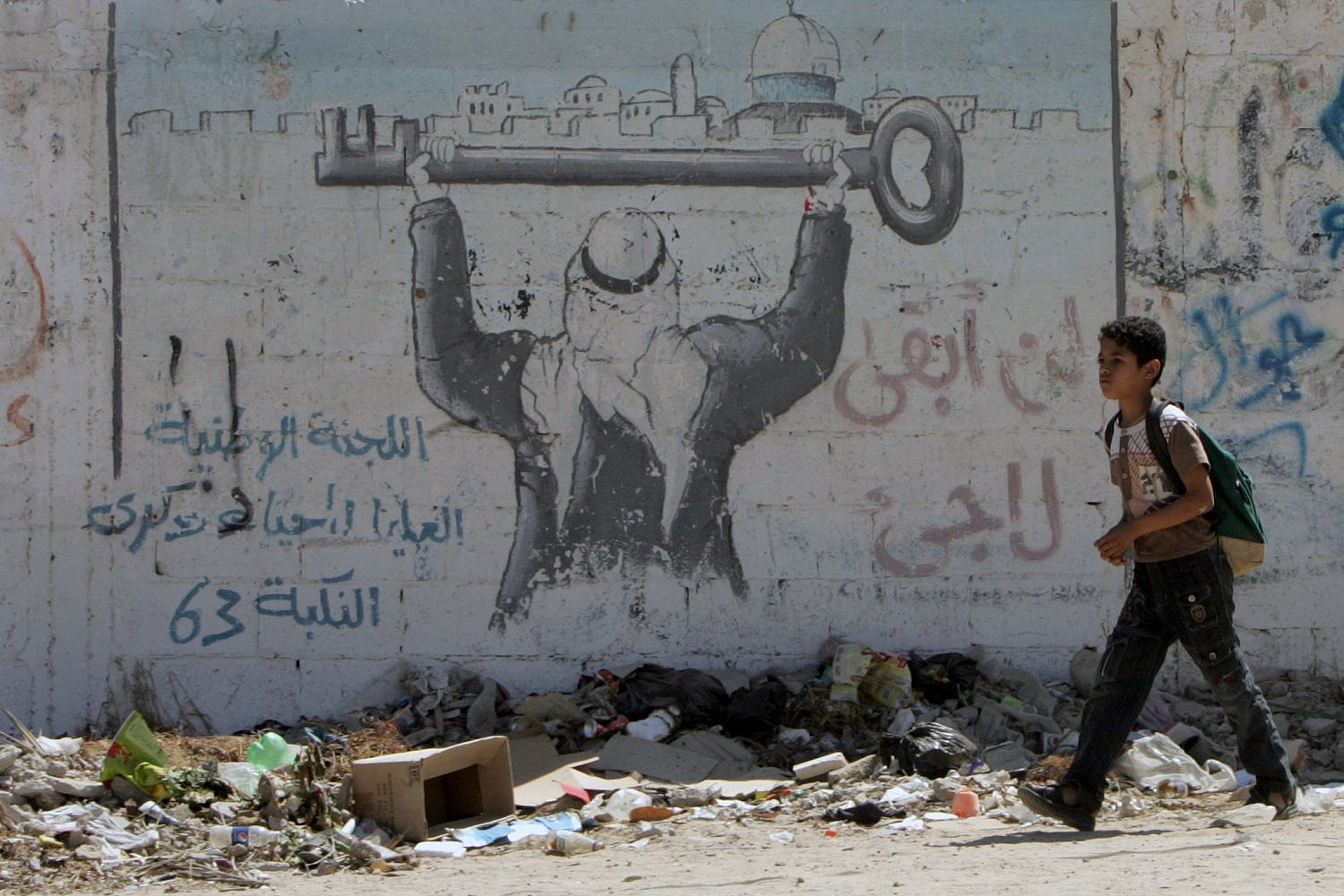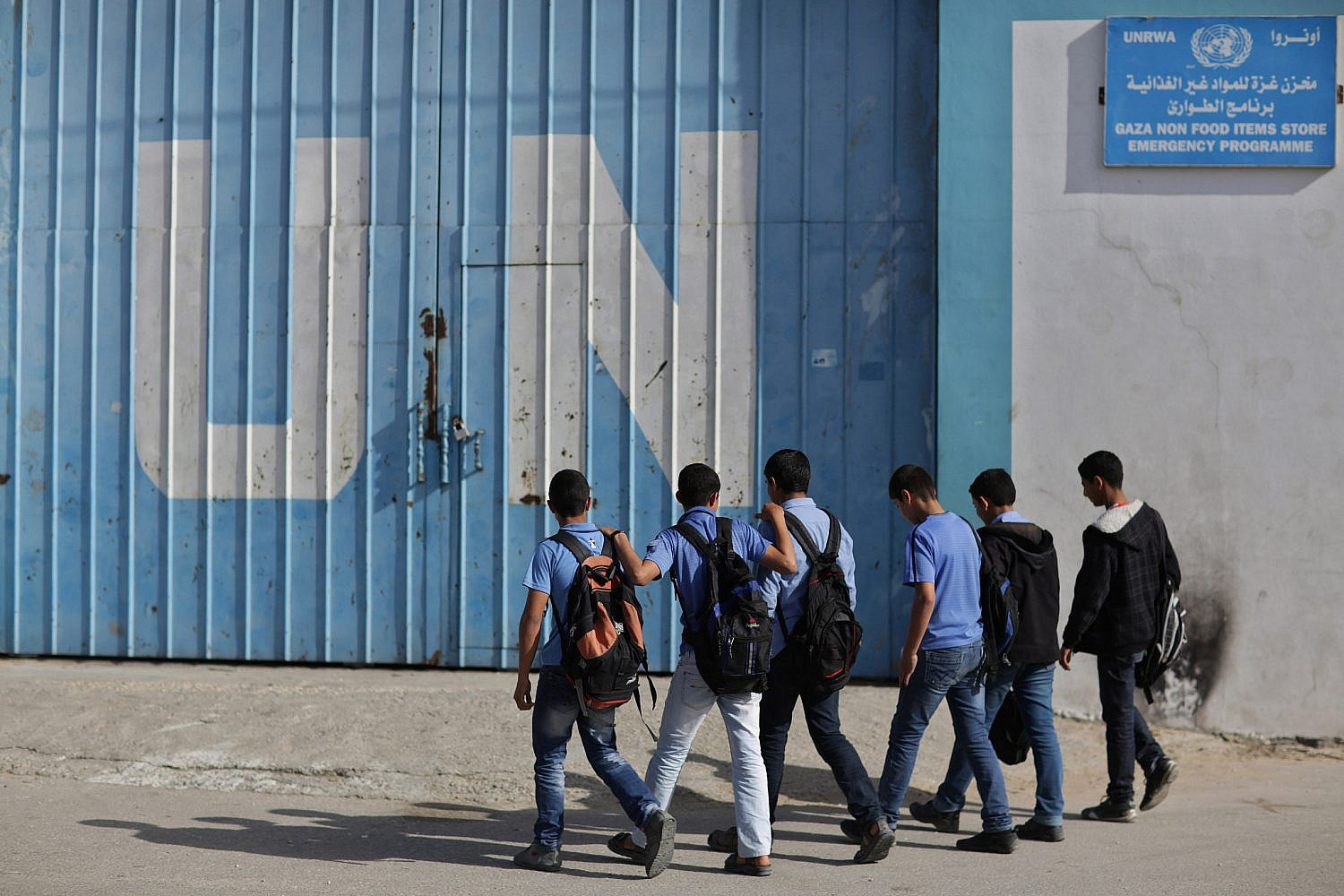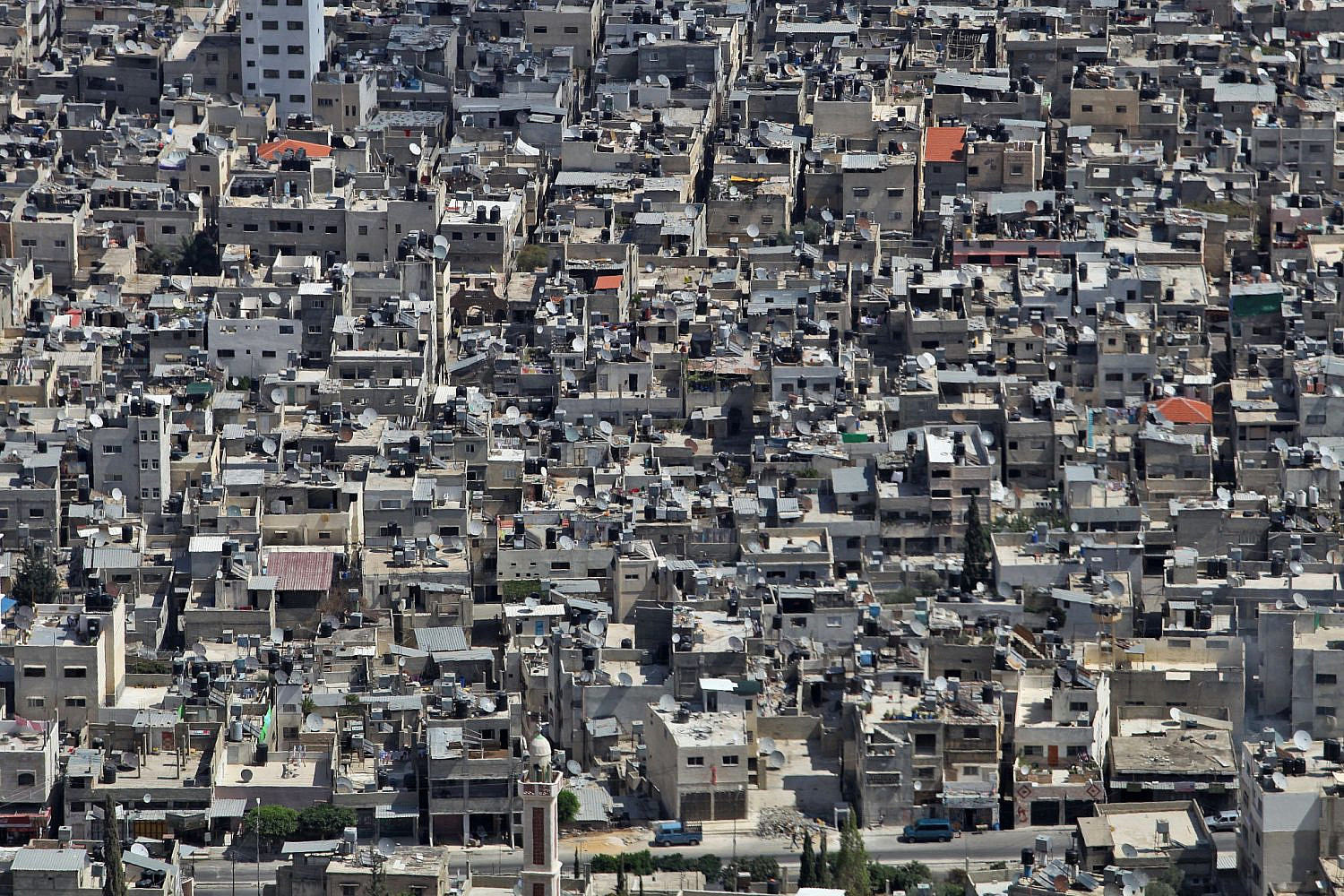Common Grounds
International law sides with Palestinian refugees. But can it solve their plight?
Source: +972 Magazine
https://www.972mag.com/palestinian-refugees-international-law-review/
By Sam Bahour
Published May 2, 2021
A new book dives into the myriad laws that protect Palestinian refugees and their right of return. Its proposed solution, though, may be hard to swallow.

UNRWA staff members protest against budget cuts outside the UNRWA offices in Gaza City, April 14, 2019. (Hassan Jedi/Flash90)
“Palestinian Refugees in International Law” by Francesca P. Albanese and Lex Takkenberg, Second Edition, Oxford University Press, 2020, 608 pages.
I was recently on a video call with a longtime Jewish Israeli friend from Jerusalem. He is a highly educated, deeply cultured, politically liberal, and progressive academic who is outspoken and well-written on the need for Israel to end its military occupation of Palestinians and to stop its discrimination against Palestinian citizens of Israel.
But our political conversation hit an odd silence when, during the course of our conversation, I told him that peace can only be realized once Israel recognizes the right of Palestinian refugees — who fled or were expelled during the Nakba in 1948, and whose descendants remain in exile — to return home. His rebuttal was a stutter, a clear dismissal of the idea that such a return could ever materialize.
I am used to such conversations, especially with Jewish Israelis and Jewish Americans. Upon learning the historical facts and present realities on the ground, many of them can easily come to terms with the need for Israel to end its military domination over 5 million Palestinians in the West Bank and Gaza. And yet, for reasons that are beyond me, they expect Palestinians dispossessed by Israel’s creation to “just get over it.” At the same time — and sometimes in the same breath — they argue that any Jew in the world has the “right” to relocate to Israel and fast-track Israeli citizenship based on a 2000-year old claim to the land.
I was therefore pleased to offer my friend a new resource to encourage him to rethink his dismissal. “Palestinian Refugees in International Law” by Francesca P. Albanese and Lex Takkenberg is a fascinating, comprehensive book which meticulously lays out the case for the right of Palestinian refugees to return home and to be compensated for their 73-year dispossession.
Both authors, who caught my attention a few weeks ago during a webinar about the book hosted by the Institute for Palestine Studies, are deeply informed on the subject both as scholars and practitioners. Albanese, an affiliate researcher with the Georgetown University Institute for the Study of International Migration, previously worked as a legal officer at the United Nations Relief and Works Agency (UNRWA) and at the Office of the High Commissioner for Human Rights (OHCHR). Takkenberg has worked with UNRWA since 1989, most recently as the former chief of its ethics office, and before that was a legal officer at the Dutch Refugee Council.

Palestinians protest against the U.S. announcement that it would stop funding the UN programme for Palestinian refugees, outside the UN offices in the West Bank city of Hebron, Sept. 8, 2018. (Wisam Hashlamoun/Flash90)
This is not a book for the lighthearted, and cannot be fully appreciated in a single reading, particularly if one wants to comprehend the myriad layers of legal doctrines that are dissected by the authors for a non-legal reader. The sheer quantity of information packed into this book is also far more than can be captured in a single review, and the bibliography is one of the most extensive I have seen in a single volume. It is nonetheless an invaluable resource to the conversation.
Hasbara slogans
The plight of Palestinian refugees to return home is one of the world’s most significant struggles for historical justice. Palestinians continue to feel the pain of those few elderly refugees who are still alive to tell the tale of their uprooting in the Nakba of 1948, as well as the pain of their descendants who remain in exile — many of whom are still dwelling in squalid refugee camps across the region, while Israel keeps its borders closed to deny their repatriation.
However, the powers that be — even if they came to realize the rightness of the refugees’ struggle — are hardly interested in pressuring Israel to allow them to return or to hold the state accountable. After all, along with their geopolitical calculations, many of these powers like the United States were themselves established after displacing their indigenous peoples.
Moreover, the well-oiled Israeli state propaganda machine, known in Hebrew as hasbara, along with its proxy organizations, have had the luxury of time and impunity to perfect their messaging around the question of Palestinian refugees, so much so that it can neatly fit into single Twitter posts. These slogans are well known: “Israel accepted the 1947 UN Partition Plan and the Arabs did not, so tough luck;” “Jews have only one country, Arabs have 22 that the refugees can go to;” “Israel’s acceptance of a ‘right of return’ would amount to national suicide;” and “the existence of UNRWA prolongs the refugee status,” among many others. Many of these worn-out falsehoods continue to this day, including in a book written by Israeli authors Adi Schwartz and Einat Wilf based on this hasbara in an attempt to smear the refugees (which I reviewed last year).
Tackling this context, the “Palestinian Refugees in International Law” is a landmark reference as we approach the 73rd commemoration of the ongoing Nakba.

Palestinian boy walks front of graffiti that reads ‘Returning’ as Palestinians attend “Camp of Return” to mark refugees’ ties to their lost land, in Rafah, southern Gaza Strip, May 12, 2013. (Abed Rahim Khatib/Flash90)
The volume, based on a prior book by Takkenberg on the topic, is divided into three parts: the historical and legal foundations of Palestinian refugees’ rights; the story of their seventy years of exile; and paths to ensuring protection and building solutions. The authors address many of the prevailing arguments on the matter with well-documented legal references, covering the origins of the Palestinian refugee community, their collective and individual rights under a multitude of laws, their state of affairs in the four corners of the world today, and the obligations of states to facilitate their well-being, protection, and realization of legally sound “durable solutions.”
Some of the key issues that the book answers are ones that many Israelis and Palestinians lightly throw around today, but often lack the depth or legal framing required to gain a fuller understanding. Significantly, the authors also examine how the issue of refugees was dealt with, and ultimately damaged, by the dragged-out Middle East peace process.
The disadvantage of exceptionalism
One of the focal points the authors address is UN General Assembly Resolution 194, which resolved that “refugees wishing to return to their homes and live at peace with their neighbours should be permitted to do so at the earliest practicable date, and that compensation should be paid for the property of those choosing not to return and for loss of or damage to property […]” The book also gives a thorough treatment of why the UN decided to create a separate agency, UNRWA, specifically for Palestinian refugees.
As any student of history will attest, the text of a legal document such as UNGA 194 is one thing, but the political debate behind that text reveals the drafters’ real intentions. As such, key questions around these aspects are explained, including how it fit into a flurry of UN actions on Palestine at the time, the real weight of such a General Assembly resolution, what the various state actors’ positions were when voting for the resolution, and perhaps most importantly, whether it has a statute of limitations. It is interesting to note that UNRWA was established with the support of the United States, and even Israel agreed to accept resolution 194 as a condition for its UN membership.
Taking the reader on a step-by-step journey through this historical context, the authors make a compelling, almost counterintuitive argument: that in being addressed by a specific agency rather than the global UN Refugee Agency (UNHCR), Palestinian refugees are actually at a disadvantage. “‘[E]xceptionalism’ (namely, [the Palestinian refugee question] being treated as different from any other refugee question and often outside the scope of relevant legal frameworks) has contributed to a lesser standard of protection,” the authors argue. “This is not an endemic and unchangeable characteristic of it, but rather the result of the relevant stakeholders approaching this question as a matter circumscribed by politics rather than international law.”

Palestinian demonstrators take part in a protest march against the U.S. Middle East peace plan announced by President Donald Trump, in Gaza City, Feb. 21, 2020. (Ali Ahmed/Flash90)
The authors also explain the frequently overlooked distinctions made between various categories of dispossessed Palestinians. For example, although UNRWA is mandated to address refugees who were displaced during Israel’s establishment in 1948, Palestinians who were made refugees during the 1967 Six Day War are to this day classified as “displaced persons,” even though their predicament is the same as the original refugees.
The book also recounts some of Israel’s darkest foundational acts, including “Plan D” of March 1948 that aimed to expel Palestinians even before Israel’s formal establishment. It notes that “[a]s early as in the 1930s, the Jewish Agency had established a Population Transfer Committee, which devised schemes to remove the Palestinian population by securing land for them in neighboring states, or by having Britain remove them. During the 1948 war, several Transfer Committees were set up, by, or in coordination with, the Jewish Agency, and later the Israeli government, to ‘facilitate’ the exodus.” So much for the opinion that Palestinians left their homes at their own will.
The book even goes so far as to reference various evaluations of the material costs of the losses incurred by Israel on the Palestinian refugees, presenting figures of over $330 billion (in 2019 terms) as conservative estimates, which of course do not count the non-material damage incurred.
In addition to the horrors of mass expulsion, one of the most revolting acts discussed in the book — and which hinted early on how much the struggle for return would be an uphill battle — was the fate of Count Folke Bernadotte, a Swedish diplomat and president of the Swedish Red Cross, who was appointed by the UN as mediator for Palestine in May 1948. In his Sept. 16, 1948 progress report to the Security Council on the refugee issue, Bernadotte wrote:
| It would be an offence against the principles of elemental justice if these innocent victims of the conflict were denied the right to return to their homes while Jewish immigrants flow into Palestine, and, indeed, at least offer the threat of permanent replacement of the Arab refugees who have been rooted in the land for centuries… [t]he right of the Arab refugees to return to their homes in Jewish-controlled territory at the earliest possible date should be affirmed by the United Nations, and their repatriation, resettlement and economic and social rehabilitation, and payment of adequate compensation for the property of those choosing not to return, should be supervised and assisted by the United Nations. Bernadotte paid for those words with his life. He was assassinated on Sept. 17, 1948 — one day after submitting the above report — by a member of the Zionist paramilitary group Lehi, which opposed his mediation efforts. |

Palestine refugees initially displaced to Beach Camp in Gaza board boats to Lebanon or Egypt during the first Arab-Israeli war, 1949 (UN Archives Photo/Hrant Nakashian)
Political will
Part two of the book walks the reader through all the geographic locations where Palestinian refugees currently reside, their varying and precarious legal statuses, and the sets of laws that ought to apply to secure their protection. This part of the book digs deep into the consciousness of anyone who has worked on the refugee issues, for it shows that, as long as Israel continues to enjoy impunity, it will only further complicate the predicament and create even more refugees, while getting away with a myriad of crimes in broad daylight.
For most non-legal readers, however, the most anticipated part of the book will be the authors’ attempt to craft a solution for the Palestinian refugees. Unlike the conclusions of many fatigued and frustrated observers, the authors are keen to note that the Palestinian refugee issue is “not intractable.” Palestinians are not the world’s first refugee community and, sadly, they will not be the last — yet it is important to remember that other refugee files, many of which also seemed impossible to address, have been successfully closed.
The tools to realize “durable solutions,” the authors argue, are ready to be utilized. At the forefront is return itself, but there is also restitution, compensation, reconciliation, resettlement, and more. The only barrier to progress is the lack of political will by the powers that be.
Palestinian refugees, the authors write, “constitute the largest de jure stateless population in the world” — and like it or not, the passing of time is indeed a factor in the application of international law. Still, they note, the development of new international mechanisms may provide fresh opportunities that did not exist when Palestinians first became “denationalized en masse.”
In particular, the authors reference the UN General Assembly’s adoption of the New York Declaration on Refugees and Migrants in 2016, which led to the development of a Global Compact on Refugees in 2018. This compact, according to its text, “intends to provide a basis for predictable and equitable burden and responsibility-sharing among all United Nations Member States, together with other relevant stakeholders.” Though not legally binding, the compact asserts that it “represents the political will and ambition of the international community as a whole for strengthened cooperation and solidarity with refugees and affected host countries.”

Palestinian students walk past a UN distribution center in the Jabaliya refugee camp in the northern Gaza Strip, April 6, 2013. (Wissam Nassar/Flash90)
Taking inspiration from this document, the authors propose “[t]he development of a comprehensive response framework for Palestinian refugees [that] would initiate a fresh exploration of solutions, including measures to support ‘mobilization of political will, a broadened base of support, and arrangements that facilitate more equitable, sustained and predictable contributions — burden sharing — among States and other relevant stakeholders.’” Palestinian political agency is rightfully called upon to lead this effort.
This idea is by no means a fast-track to getting Palestinians back home. But an ongoing problem created more than 70 years ago will surely need a comprehensive and multifaceted approach to resolving it. As the authors explain, “[t]he international refugee regime distinguishes two main alternatives to end refugee status: voluntarily return to one’s country of origin or assimilation in new communities. The latter encompasses either local integration in the country of first refuge or resettlement in a third state (both ideally culminating in naturalization).”
They continue, “When return to the country of origin in safety and dignity is not feasible, at least for the foreseeable future, local integration, eventually though naturalization in the country of first asylum, normally a neighbouring country, is the preferred durable solution.” With these principles at play, the authors acknowledge that “[e]ven if meaningful negotiations were to resume, the asymmetry of power between Israelis and Palestinians, unless counter-balanced by international actors, would make it difficult to achieve a just resolution.”
A hard sell
Recognizing this difficult context, and in lieu of some Palestinians’ desire for a magical decision to allow for a mass return, the authors’ response framework calls to “determine — and inform the refugees accordingly — that any alternative durable solutions to return to modern-day Israel, including naturalization in the host country or resettlement in third countries, do not jeopardize their historic claims; rather, they should feel confident to pursue solutions that suit their current circumstances.” the authors’ framework, meanwhile, would be focused on pinning the path forward around “cooperation between UNRWA and UNHCR” and to “be centered around, and owned by Palestinians.”
Given the Palestinians’ bitter experience with the international community upholding international law thus far, this notion of dealing with “current circumstances” while assuming “historic claims” will somehow be later resolved makes the authors’ approach a hard sell. The authors admit that their framework may “may not deliver full justice in one fell swoop.” However, they argue, “it would start by giving Palestinian refugees a more secure present and a more hopeful future, as well as the voice and the agency that they have been denied to date in their pursuit of justice.”

A view of the crowded Balata refugee camp in Nablus. Balata is the largest refugee camp in the West Bank, housing nearly 30,000 people. Sept. 23, 2009. (Nati Shohat/Flash90)
Many Palestinians who continue to think and act based on realities and slogans of yesteryear will find the ideas in this last part of the book hard to swallow. I know I did. As anyone engaged in the struggle for righting the multitude of wrongs done to Palestinians will attest, international law is merely one vantage point, albeit an extremely important one, to serve as a platform for correcting the harms of history. Other prisms Palestinians must engage with, in parallel, start with presenting our case wherever there may be hope for action, and end with changing the balance of power on the ground by levying a cost on Israel.
My Jewish Israeli friend may not yet be able to stomach the idea of Palestinian refugees and their descendants returning to Israel. He may not even stomach the book I recommended to him. Yet there still are Israeli Jews who understand the colonial origins of the expulsion of Palestinians from their homeland, and the need to rectify them. As the indomitable Israeli journalist Amira Hass wrote in Haaretz in early April:
| Under the cover of the ‘peace process,’ Israel increasingly denies any historical, emotional, cultural or material ties of the Palestinians to their homeland. In the past 30 years, the Jewish state has proven over and over again the correctness of the arguments made by Palestinians since the 1920s and ‘30s — that Zionism is a colonialist movement, and that expelling a people from its land is its purpose and its side effect. |
The source of Palestinian dispossession, military occupation, and structural discrimination is visible to all who care to see. The question remains: will Palestinian refugees be able to come home in an orderly fashion, or does all hell have to rise again?
LATEST OPEN LETTERS
-
21-07Freedom
-
20-03Stand up to Trump
-
18-02Average Americans Response
-
23-12Tens of thousands of dead children.......this must stop
-
05-06A Call to Action: Uniting for a Lasting Peace in the Holy Land
-
28-05Concerned world citizen
-
13-02World Peace
-
05-12My scream to the world
-
16-11To Syria and Bashar al-Assad
-
16-11To Palestine
VIRTUAL POST OFFICE
PETITIONS
LINKS
DONATION
Latest Blog Articles
-
15-12The Evangelical Pope | The Universal Value of Life
-
11-12Our Friday News Analysis | What the World Reads Now!
-
10-12Our Wednesday News Analysis | A story of a 1930s uprising against British colonialism is key to understanding Gaza today
-
09-12A story of a 1930s uprising against British colonialism is key to understanding Gaza today
-
09-12Netanyahu rules out creation of Palestinian state
-
09-12Israel has shown how to carry out a genocide and get away with it
-
08-12The Evangelical Pope | Humility – the Power of Truth and Love
-
04-12Our Friday News Analysis | What the World Reads Now!
-
03-12Our Wednesday News Analysis | Gaza’s Darkest Lesson: Exposing the True Allies and Enemies of Palestine
-
02-12Gaza’s Darkest Lesson: Exposing the True Allies and Enemies of Palestine
-
02-12Analysis The Visionary Palestinian Peace Plan for Israel and Gaza That You've Never Heard Of
Latest Comments
 One of the most important and illuminating articles that I …
One of the most important and illuminating articles that I …
Comment by Benjamin Inbaraj And what's wrong here?
After all, there is the homeland …
And what's wrong here?
After all, there is the homeland …
Comment by Isac Boian Does this reinforce or deny my argument that Israel is …
Does this reinforce or deny my argument that Israel is …
Comment by Edward Campbell Many 'say' they support the Palestinian cause but do little …
Many 'say' they support the Palestinian cause but do little …
Comment by Philip McFedries The UN is strangled by the "war for profit" cabal …
The UN is strangled by the "war for profit" cabal …
Comment by Philip McFedries I can't read the printing on the map.
I can't read the printing on the map.
Comment by Philip McFedries Good news!
Good news!
Comment by Philip McFedries

COMMENTS
This article has 0 comments at this time. We invoke you to participate the discussion and leave your comment below. Share your opinion and let the world know.